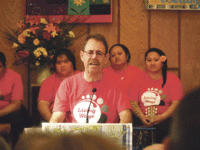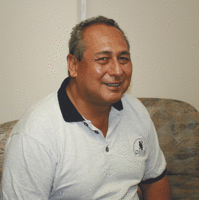Features
Cecily McNeill
4 February 2013
 The concept of a living wage will be fleshed out at a conference in Auckland this month where research into the idea and how it might be applied in Aotearoa New Zealand will be presented.
The concept of a living wage will be fleshed out at a conference in Auckland this month where research into the idea and how it might be applied in Aotearoa New Zealand will be presented.
The Living Wage Campaign is designed to get people to reflect on what a living wage should be, to bring people back to basics, says Service and Food Workers Union national secretary John Ryall.
‘What value should New Zealanders place on any legislation? Should we base it on an efficient economy if you have an enormous gap between the rich and poor when the workers at the bottom of the heap are working 70 to 80 hours a week and can’t get enough money to support their families?’
An increasing number of businesses in the United Kingdom have signed up to the campaign there and British Prime Minister David Cameron has described it is an ‘idea whose time has come’.
Observer columnist Yvonne Roberts reported on 10 November that ‘100 companies became officially accredited living wage employers, including KPMG, Save the Children and Linklaters, the legal firm.’
But, in this country where, according to Council of Trade Unions economist Bill Rosenberg, income inequality has reached its highest ever, the response from employers has been muted.
Caritas Aotearoa New Zealand has signed up to the Living Wage statement and has taken steps to increase the minimum wage paid to the lowest paid Caritas workers, with further increases possible in the future.
Director Julianne Hickey said Caritas supported the campaign because ‘the dignity of work, and of the people who work, is a core value in Catholic social teaching’.
Thames Publications in Wellington, which has a number of government departments among its clients, pledged support for the Living Wage Campaign on the day of its Wellington launch last August. Managing director Phil Jones told the Dominion Post that paying a living wage is good for business, keeping the workplace happier.
‘We support that people are paid enough so they live and not just exist. They should be able to support their families, have a decent place to live, and not have to work multiple jobs.
‘There are benefits to society – those people will be able to spend more money,’ Mr Jones said.
But Business New Zealand chief executive Phil O’Reilly told The Dominion Post on 30 August New Zealand employers feel the wages they pay are fair. He believed the Living Wage Campaign was fundamentally flawed.
‘It ignores the fact that a lot of those people who are earning at or just above the minimum wage are already the recipients of some very significant social assistance in all sorts of ways.
‘Free doctors’ visits, free hospitals, transport assistance … tax benefits, Working For Families…’
John Ryall says wage rates in this country have suffered since the Employment Contracts Act 1991 destroyed the system for national awards – the basis for wages and conditions in this country since the 1890s. On top of the minimum wage introduced in 1945, a series of awards became the living wage.
So cleaners on $13.85 an hour, which is just above the minimum wage of $13.50 without allowances or penal rates, can cross the Tasman and earn at least $A18.58 [$NZ23.25] an hour, plus time-and-a-quarter at nights, time-and-a-half at weekends and allowances for transport which are all part of the award. ‘So there’s a vast difference for those at the bottom of the heap.’
 Union organiser Mea’ole Keil says cleaners showed a marked improvement in their wellbeing after July 2007 [when the Helen Clark-led government stepped into a dispute involving hospital workers and their employer and brokered an agreement to pay $14.25, $3 above the minimum wage].
Union organiser Mea’ole Keil says cleaners showed a marked improvement in their wellbeing after July 2007 [when the Helen Clark-led government stepped into a dispute involving hospital workers and their employer and brokered an agreement to pay $14.25, $3 above the minimum wage].
‘People were noticeably more relaxed. Why? Because there was no longer a need to take a second job in the evening. The change in mood, in family life was palpable.’
The symposium on the living wage, ‘Precarious Work and the Living Wage in our communities’ in Auckland on 14-15 February will look at new ‘robust’ research about what constitutes a living wage. Speakers from the UK and Canada will also address the conference.
UK employers who have implemented the living wage report better retention of staff, lower rates of absenteeism, lower costs of training new recruits and better service, says Yvonne Roberts.
‘Research by two think tanks, the Resolution Foundation and IPPR, indicates that certain industries could pay the living wage with minimal financial impact. The industries include banking, construction and food production. In addition, low wages are topped up by tax credits that cost taxpayers £4bn a year, a subsidy to low-paying employers. According to the Institute for Fiscal Studies, a living wage reduces the benefits bill and increases national tax revenues.’
John Ryall says workers’ rights and a just wage is good for everyone. A fair wage cuts down a lot of social conflict.
He quotes a comparison of inequality in OECD countries cited in The Spirit Level (2009) which showed countries that ensure everyone gets a fair share of what society produces are better places for everyone. The crime rate is down as is drug addiction.
This is about the common good which ensures the wellbeing of all by paying particular attention to the most vulnerable.
The Auckland symposium 14 and 15 February is important because of the debate about what it means. The government says keeping the minimum wage low allows the economy to grow and benefits will trickle down to workers.
‘We are saying that trickle down doesn’t work. The minimum wage doesn’t bear any relationship to what it costs to live. It’s time for a different approach and a focus on a living wage.’
Images:
- Service and Food Workers Union national secretary John Ryall launching the Living Wage Campaign in Wellington last August. (Photo: Derek Johnson)
- Union organiser Mea’ole Keil